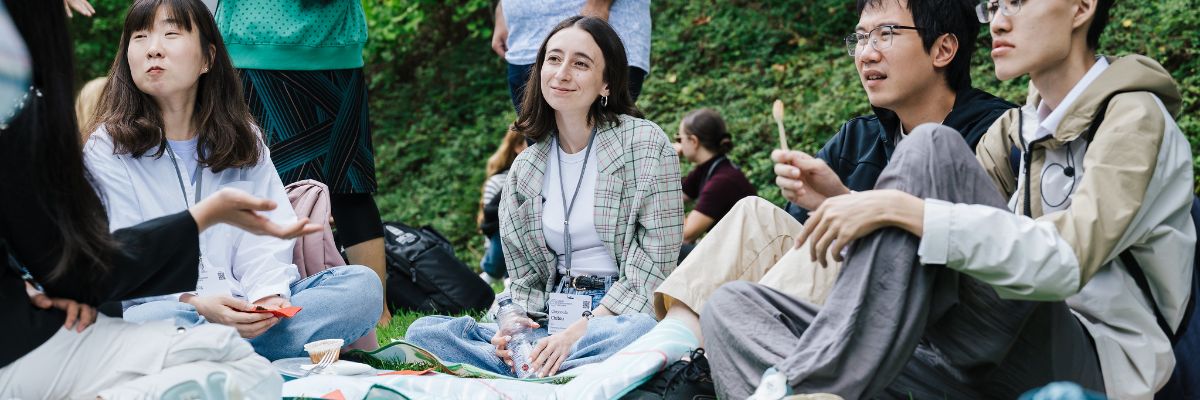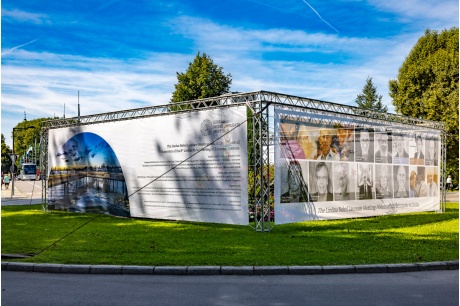
Young scientists discussed economic challenges with Nobel laureates in Lindau
15. 09. 2025
Climate change, the fragility of financial systems, and other pressing issues were at the center of discussions between young researchers and Nobel Prize laureates in economics at a meeting held from 26 to 30 August 2025 in Lindau, Germany. What impressed Clara Sievert from CERGE-EI, a joint workplace of the Czech Academy of Sciences and Charles University, in her conversations with the laureates?
At Lake Constance in Lindau, late August provided a unique setting for dialogue between experienced scholars and early-career researchers. The eighth Lindau Nobel Meeting in Economic Sciences brought together twenty laureates of the world’s most prestigious award and more than three hundred young researchers from over fifty countries. The debates focused on urgent global challenges as well as long-standing questions in economics. In addition to lectures and panel discussions, the organizers also included more informal formats – such as science walks with Nobel laureates.
The main topics centered on the role of institutions in economic development, the fragility of financial systems, and the challenges associated with climate change and international cooperation. One discussion that attracted considerable attention focused on research and innovation in a so-called “tripolar world,” where diverse geopolitical and economic interests collide.
Young researchers actively contributed to the program with more than seventy presentations, complementing the contributions of renowned figures – including former President of the European Central Bank Mario Draghi. The highlight of the program was the gathering on Mainau Island, where participants debated whether institutions primarily strengthen a privileged minority or whether they can genuinely serve society as a whole.

Connecting the “young” and the “less young”
Clara Sievert from CERGE-EI, who specializes in development economics, political economy, and health economics, noted that a great benefit the Lindau meeting offers is networking. “I connected with many current PhD students from around the world, especially the US. The network is very important to stay up to date on the research frontier, for research exchange, organizing conferences, and advising students.”
The most memorable moment for Sievert came in the form of a talk by renowned scholar Yael Tauman Kalai on cryptography. One of the highlights of the event was a trip to Mainau Island with a discussion at the castle. She also described the atmosphere of the discussions as unique. What captured the researcher’s interest was how Nobel laureates applied their knowledge and expertise to reflect on the challenges of our time – particularly climate change and the consequences of artificial intelligence development. “These are the topics at the top of young scientists’ minds today,” Sievert says.
According to the economics researcher, it is precisely the networking across generations that distinguishes the Lindau meeting from other symposia. “The mixture of ‘young’ and ‘less young’ scientists – to use the Laureates’ words – is unique,” she notes, adding that she also appreciated the stellar organization of the entire event.
“It was an honor to see the Laureates in person. I like being able to connect what I’ve learned about the foundations of economics to those who gave us those ideas,” Sievert concludes.
Written by: Luděk Svoboda, External Relations Division, CAO of the CAS
Translated and prepared by: Tereza Novická, External Relations Division, CAO of the CAS
Photo: Lindau Nobel Laureate Meetings; Petra Špringer Šimonová
Read also
- CAS researchers receive L’Oréal-UNESCO Award and Forbes recognition
- A cure for cancer? Fighting the climate crisis? Ask the data scientists
- Vice-Presidents of the CAS set priorities for 2025–2029 term
- Public Hearing: “Making Sense of Open Science”
- SUNER-C concludes after three years dedicated to the renewable energy future
- A trapped state: The pandemic impact on public attitudes, trust, and behavior
- Aerial archaeology: Tracing the footsteps of our ancestors from the sky
- Archaeologists uncover ancient finds along Prague Ring Road
- Our microbiome largely depends on what we eat, says microbiologist Michal Kraus
- The ABCs of writing: Why did its invention mark a turning point for humankind?
Contacts for Media
Markéta Růžičková
Public Relations Manager
+420 777 970 812
Eliška Zvolánková
+420 739 535 007
Martina Spěváčková
+420 733 697 112